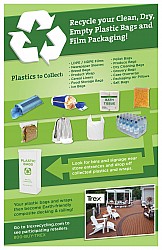“Beauty is more than board deep” says Trex® Company in describing its resilient and ![]() versatile decking that looks like exotic wood, but is really made from recycled plastics and scrap wood. The company’s high-performance low-maintenance decking and outdoor products not only create beautiful spaces that endure tough conditions, but also reuse material that few other companies successfully process: plastic film.
versatile decking that looks like exotic wood, but is really made from recycled plastics and scrap wood. The company’s high-performance low-maintenance decking and outdoor products not only create beautiful spaces that endure tough conditions, but also reuse material that few other companies successfully process: plastic film.
In 1996, the new idea of producing composite building materials that were weather resistant, good looking, and low maintenance created quite a buzz in the building trade. The composite material provided builders and homeowners alike an alternative to costly painting and staining of traditional lumber exposed to the elements. Since then, Trex has come a long way and now stands as the world’s largest manufacturer of wood-alternative decking and railing. The company has a robust foundation of recycling and is consistently working to improve its recycling efforts – in the northeast and throughout the country.
One of the successful efforts is the company’s involvement with the Northeast Recycling Council (NERC). “Trex has definitely benefited from its relationship with NERC,” commented Samara Norman, Senior Materials Buyer for Trex. “We’ve had the opportunity to help develop a conference session, as well as publish articles in the Email Bulletin. NERC also offers Trex the opportunity to participate in regional conversations about resource management and increasing the diversion of plastic film to recycling. It’s a win-win.”
Trex has been a Sustaining Member of NERC for four years. Trex also works along with other U.S. Green Building Council members to transform the way building and communities are designed, built and operated with the goal of creating environmentally and socially responsible spaces that improve the quality of life.
Trex’s Recycling Formula
Trex eco-friendly composite decking is made from an innovative blend of 95% scrap wood and plastic film, and includes a proprietary three-sided shell that helps to protect the board. Trex invented composite decking more than 20 years ago, well before green was a buzzword. The company was built on eco-friendly principles and successfully integrates recyclable materials into high-performance products that last for decades.
So where does the plastic come from? The average 500-square foot composite Trex deck  contains the equivalent of 140,000 recycled plastic bags! That makes the company one of the largest consumer film recyclers in the U.S. But it’s not just plastic bags that make up Trex decks. The recycling programs that Trex has in place encourage consumers to drop off plastic film of all kinds – from case overwraps to newspaper sleeves and sandwich bags.
contains the equivalent of 140,000 recycled plastic bags! That makes the company one of the largest consumer film recyclers in the U.S. But it’s not just plastic bags that make up Trex decks. The recycling programs that Trex has in place encourage consumers to drop off plastic film of all kinds – from case overwraps to newspaper sleeves and sandwich bags.
Trex is proud to sponsor local recycling programs in universities and communities throughout the country. Teams are challenged to collect more than 500 pounds of plastic film (about 40,500 plastic bags) in a six-month period and turn them over to Trex. In exchange, the company will donate a high-performance Trex composite bench to the school or community.
From Film to the Family Yard
After all of the materials are recycled, Trex manufacturing steps in. First, plastic film and scrap sawdust are purchased or gathered from recycling programs all over the U.S. Second, plastic film is ground into granules. The plastic film and sawdust are then combined and heated and mixed to a soft pliable consistency. This mixture is then formed into dimensional lumber sizes including tongue-and-groove pieces of varying lengths and thickness. The boards are then cooled and cut to standard construction dimensions. The boards are inspected for strength, color, and defects. Then they are packaged and sent to retailers and distributors for sale.
As one of the largest plastic film recyclers in the U.S., Trex saves more than 400 million pounds of plastic film and scrap wood from landfills each year. So the next time you are visiting a friend’s house for a barbecue, the deck you are standing on might look like wood, but it could have had a previous life as a piece of plastic!

